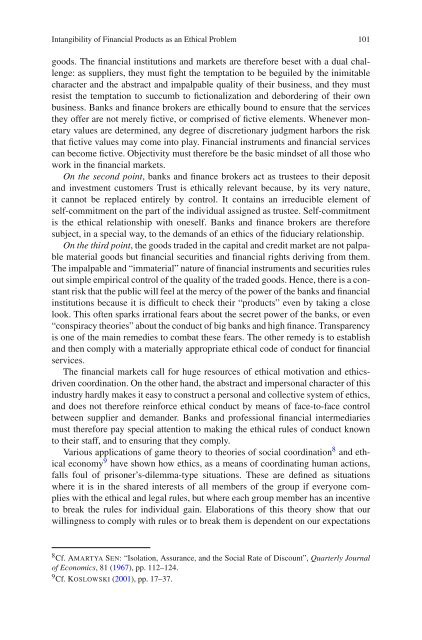The Ethics of Banking: Conclusions from the Financial Crisis (Issues ...
The Ethics of Banking: Conclusions from the Financial Crisis (Issues ...
The Ethics of Banking: Conclusions from the Financial Crisis (Issues ...
You also want an ePaper? Increase the reach of your titles
YUMPU automatically turns print PDFs into web optimized ePapers that Google loves.
Intangibility <strong>of</strong> <strong>Financial</strong> Products as an Ethical Problem 101<br />
goods. <strong>The</strong> financial institutions and markets are <strong>the</strong>refore beset with a dual challenge:<br />
as suppliers, <strong>the</strong>y must fight <strong>the</strong> temptation to be beguiled by <strong>the</strong> inimitable<br />
character and <strong>the</strong> abstract and impalpable quality <strong>of</strong> <strong>the</strong>ir business, and <strong>the</strong>y must<br />
resist <strong>the</strong> temptation to succumb to fictionalization and debordering <strong>of</strong> <strong>the</strong>ir own<br />
business. Banks and finance brokers are ethically bound to ensure that <strong>the</strong> services<br />
<strong>the</strong>y <strong>of</strong>fer are not merely fictive, or comprised <strong>of</strong> fictive elements. Whenever monetary<br />
values are determined, any degree <strong>of</strong> discretionary judgment harbors <strong>the</strong> risk<br />
that fictive values may come into play. <strong>Financial</strong> instruments and financial services<br />
can become fictive. Objectivity must <strong>the</strong>refore be <strong>the</strong> basic mindset <strong>of</strong> all those who<br />
work in <strong>the</strong> financial markets.<br />
On <strong>the</strong> second point, banks and finance brokers act as trustees to <strong>the</strong>ir deposit<br />
and investment customers Trust is ethically relevant because, by its very nature,<br />
it cannot be replaced entirely by control. It contains an irreducible element <strong>of</strong><br />
self-commitment on <strong>the</strong> part <strong>of</strong> <strong>the</strong> individual assigned as trustee. Self-commitment<br />
is <strong>the</strong> ethical relationship with oneself. Banks and finance brokers are <strong>the</strong>refore<br />
subject, in a special way, to <strong>the</strong> demands <strong>of</strong> an ethics <strong>of</strong> <strong>the</strong> fiduciary relationship.<br />
On <strong>the</strong> third point, <strong>the</strong> goods traded in <strong>the</strong> capital and credit market are not palpable<br />
material goods but financial securities and financial rights deriving <strong>from</strong> <strong>the</strong>m.<br />
<strong>The</strong> impalpable and “immaterial” nature <strong>of</strong> financial instruments and securities rules<br />
out simple empirical control <strong>of</strong> <strong>the</strong> quality <strong>of</strong> <strong>the</strong> traded goods. Hence, <strong>the</strong>re is a constant<br />
risk that <strong>the</strong> public will feel at <strong>the</strong> mercy <strong>of</strong> <strong>the</strong> power <strong>of</strong> <strong>the</strong> banks and financial<br />
institutions because it is difficult to check <strong>the</strong>ir “products” even by taking a close<br />
look. This <strong>of</strong>ten sparks irrational fears about <strong>the</strong> secret power <strong>of</strong> <strong>the</strong> banks, or even<br />
“conspiracy <strong>the</strong>ories” about <strong>the</strong> conduct <strong>of</strong> big banks and high finance. Transparency<br />
is one <strong>of</strong> <strong>the</strong> main remedies to combat <strong>the</strong>se fears. <strong>The</strong> o<strong>the</strong>r remedy is to establish<br />
and <strong>the</strong>n comply with a materially appropriate ethical code <strong>of</strong> conduct for financial<br />
services.<br />
<strong>The</strong> financial markets call for huge resources <strong>of</strong> ethical motivation and ethicsdriven<br />
coordination. On <strong>the</strong> o<strong>the</strong>r hand, <strong>the</strong> abstract and impersonal character <strong>of</strong> this<br />
industry hardly makes it easy to construct a personal and collective system <strong>of</strong> ethics,<br />
and does not <strong>the</strong>refore reinforce ethical conduct by means <strong>of</strong> face-to-face control<br />
between supplier and demander. Banks and pr<strong>of</strong>essional financial intermediaries<br />
must <strong>the</strong>refore pay special attention to making <strong>the</strong> ethical rules <strong>of</strong> conduct known<br />
to <strong>the</strong>ir staff, and to ensuring that <strong>the</strong>y comply.<br />
Various applications <strong>of</strong> game <strong>the</strong>ory to <strong>the</strong>ories <strong>of</strong> social coordination 8 and ethical<br />
economy 9 have shown how ethics, as a means <strong>of</strong> coordinating human actions,<br />
falls foul <strong>of</strong> prisoner’s-dilemma-type situations. <strong>The</strong>se are defined as situations<br />
where it is in <strong>the</strong> shared interests <strong>of</strong> all members <strong>of</strong> <strong>the</strong> group if everyone complies<br />
with <strong>the</strong> ethical and legal rules, but where each group member has an incentive<br />
to break <strong>the</strong> rules for individual gain. Elaborations <strong>of</strong> this <strong>the</strong>ory show that our<br />
willingness to comply with rules or to break <strong>the</strong>m is dependent on our expectations<br />
8 Cf. AMARTYA SEN: “Isolation, Assurance, and <strong>the</strong> Social Rate <strong>of</strong> Discount”, Quarterly Journal<br />
<strong>of</strong> Economics, 81(1967), pp. 112–124.<br />
9 Cf. KOSLOWSKI (2001), pp. 17–37.

















